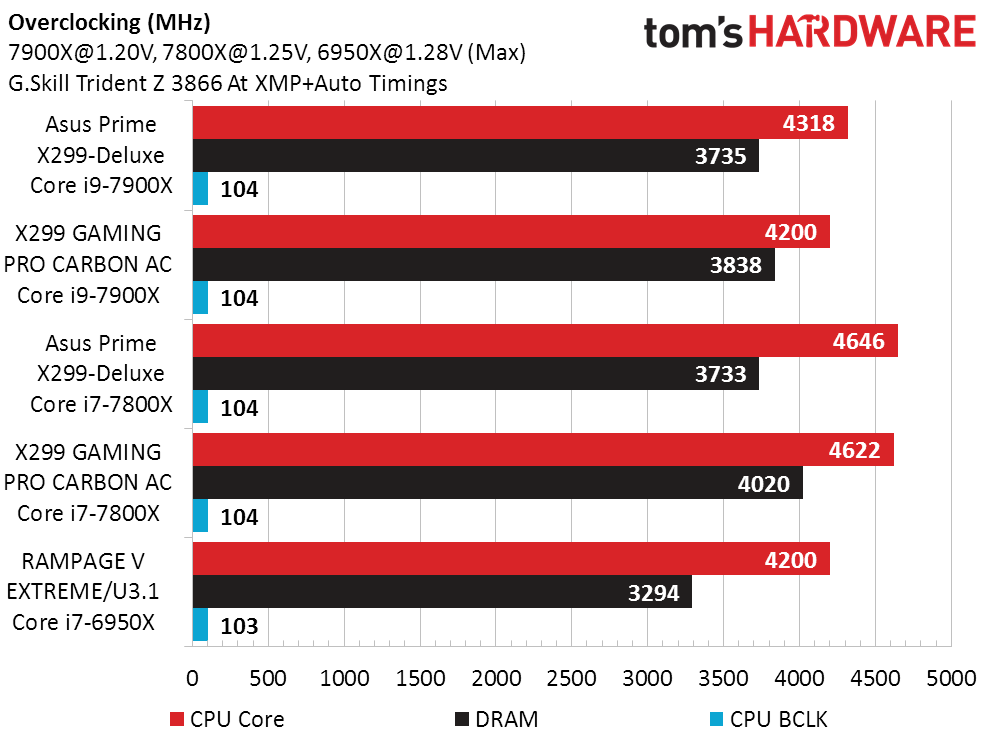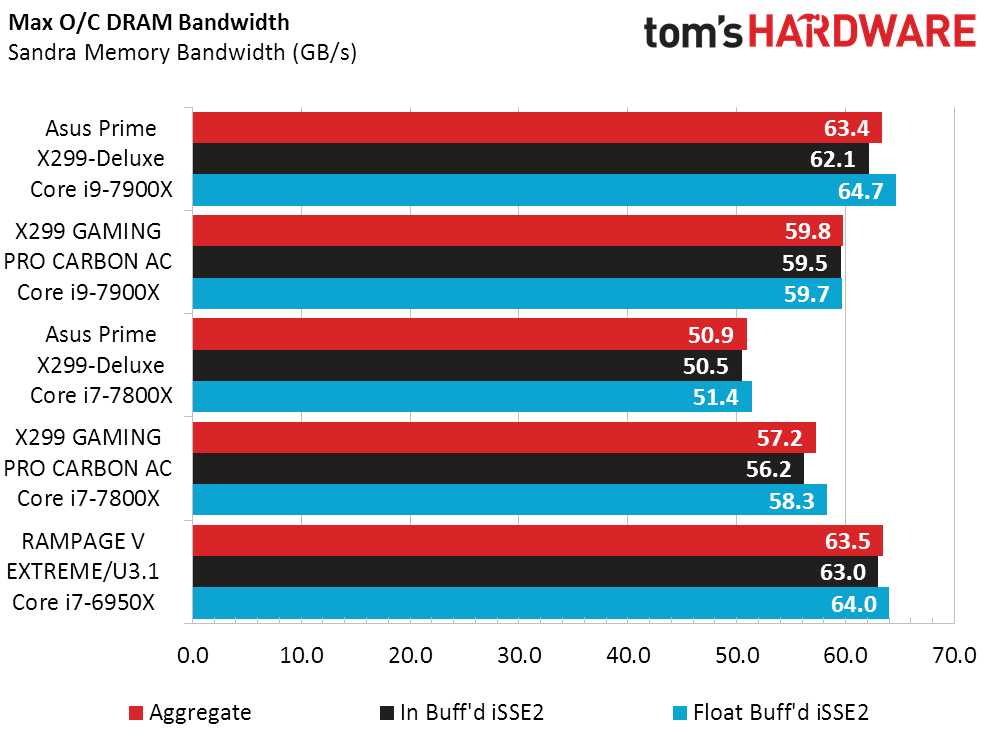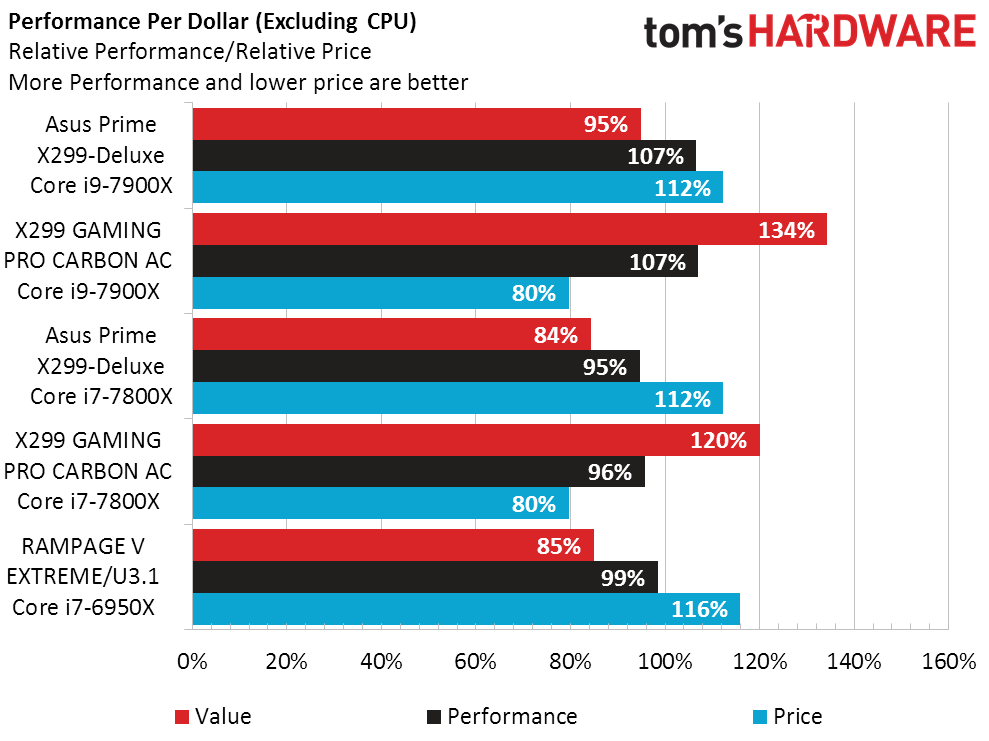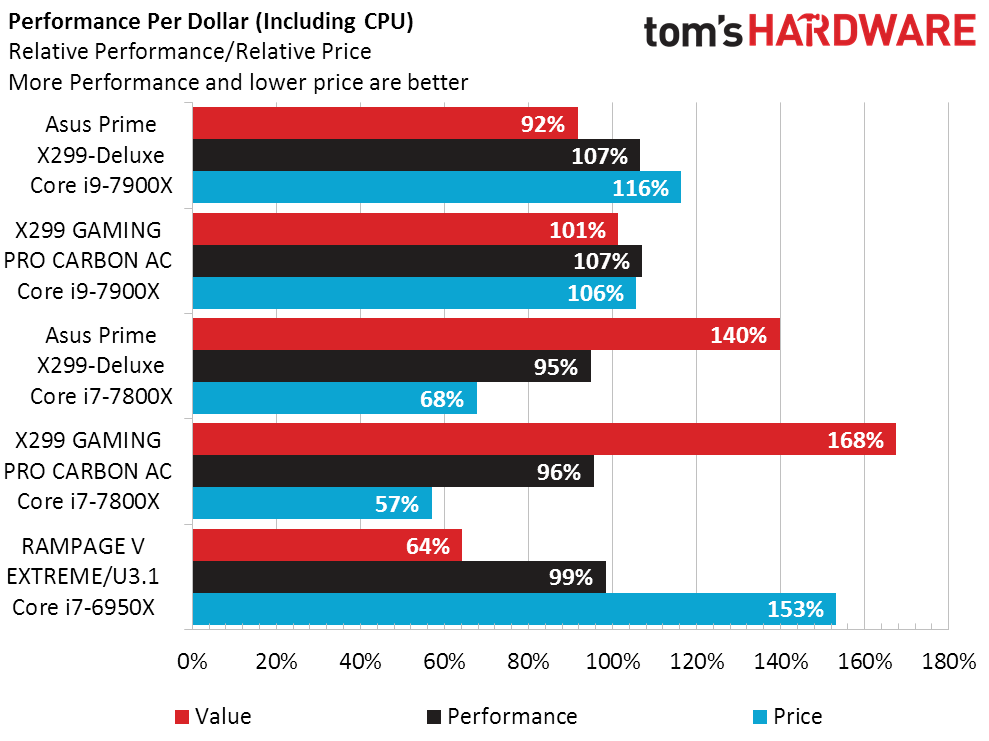Asus Prime X299-Deluxe Motherboard Review
Why you can trust Tom's Hardware
Benchmarks & Conclusion
Benchmark Results
When coupled with the Core i9-7900X, the new motherboards outperform the old X99 platform across 3DMark and PCMark just slightly. Although it's far less expensive, the Core i7-7800X can’t stand up to the prowess of a 10-core CPU in 3DMark’s Physics test.
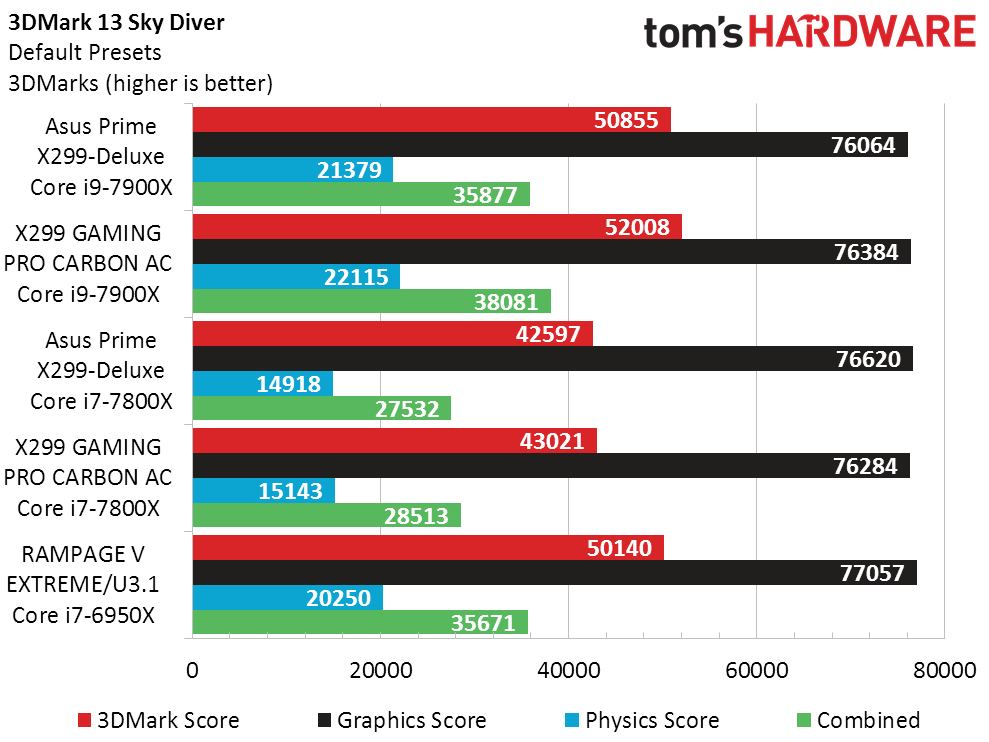
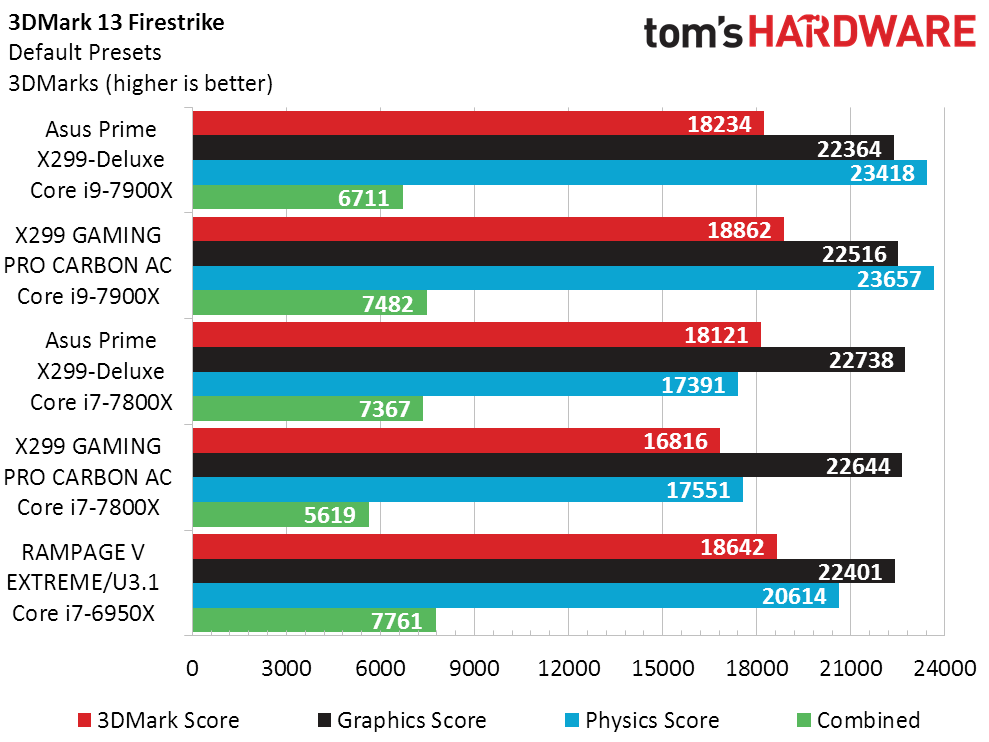
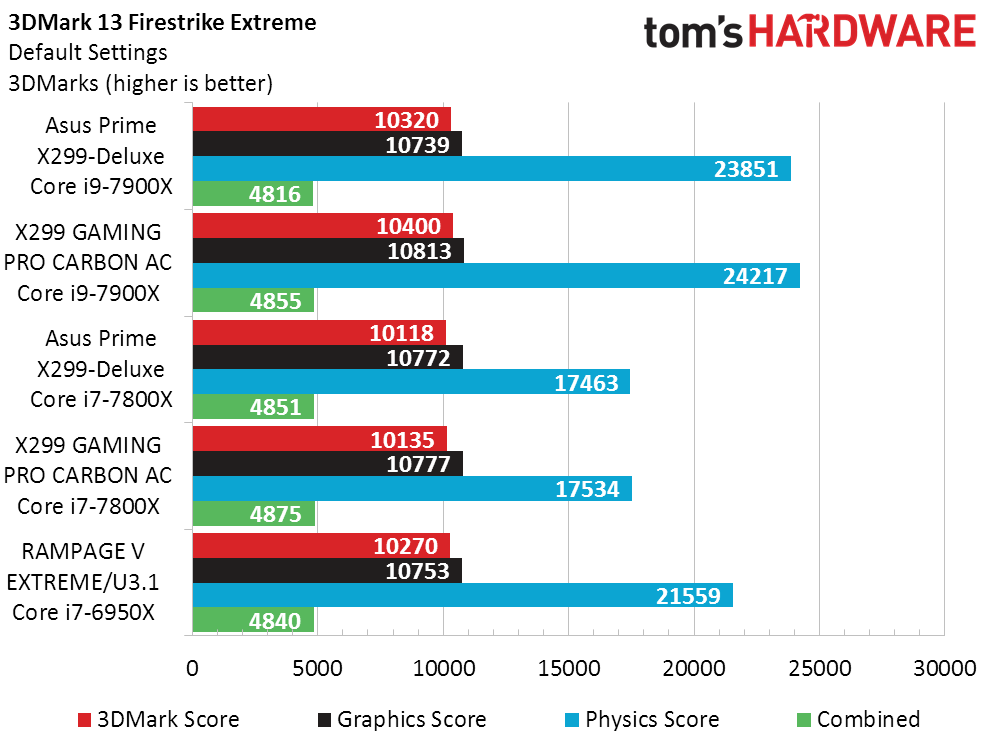
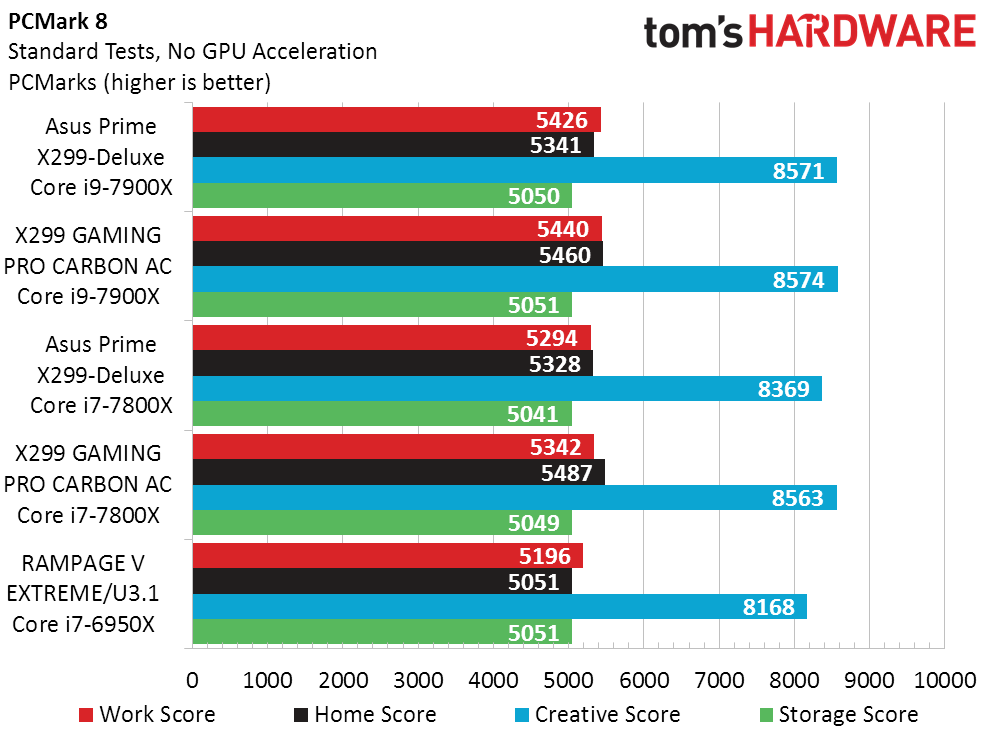
Our hopes that the moderately-priced i7-7800X would compete directly against the previous generation’s expensive 10-core CPU are extinguished in Sandra Arithmetic. However, the Core i9-7900X beats its predecessor by an even greater amount. Better still, the boards hosting these new processors are performing consistently so far.
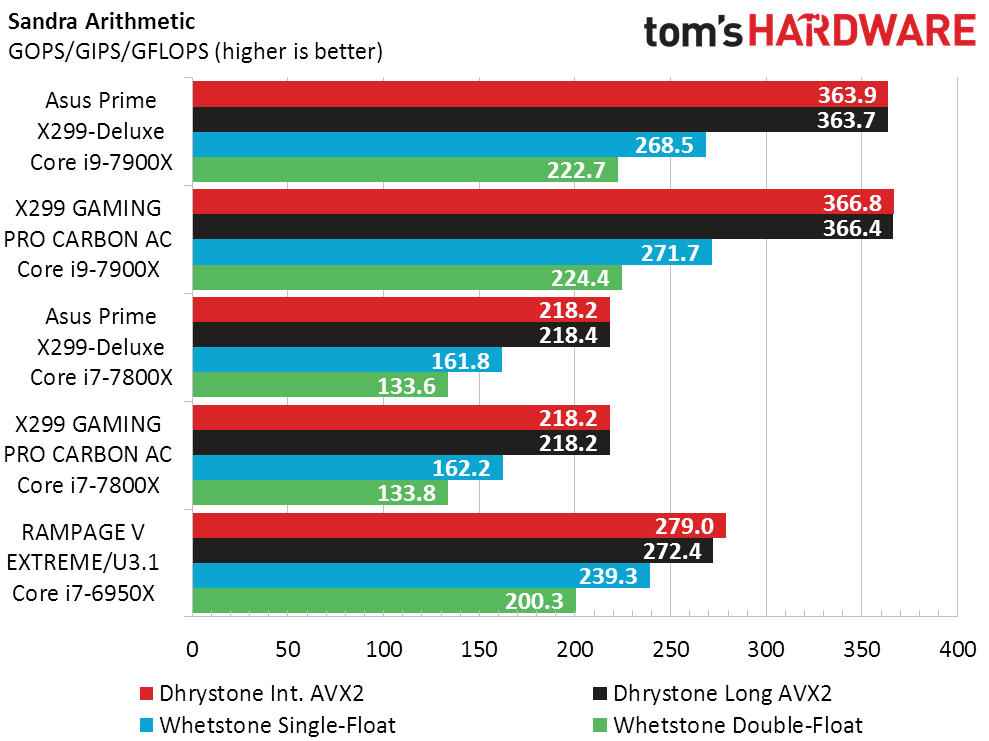
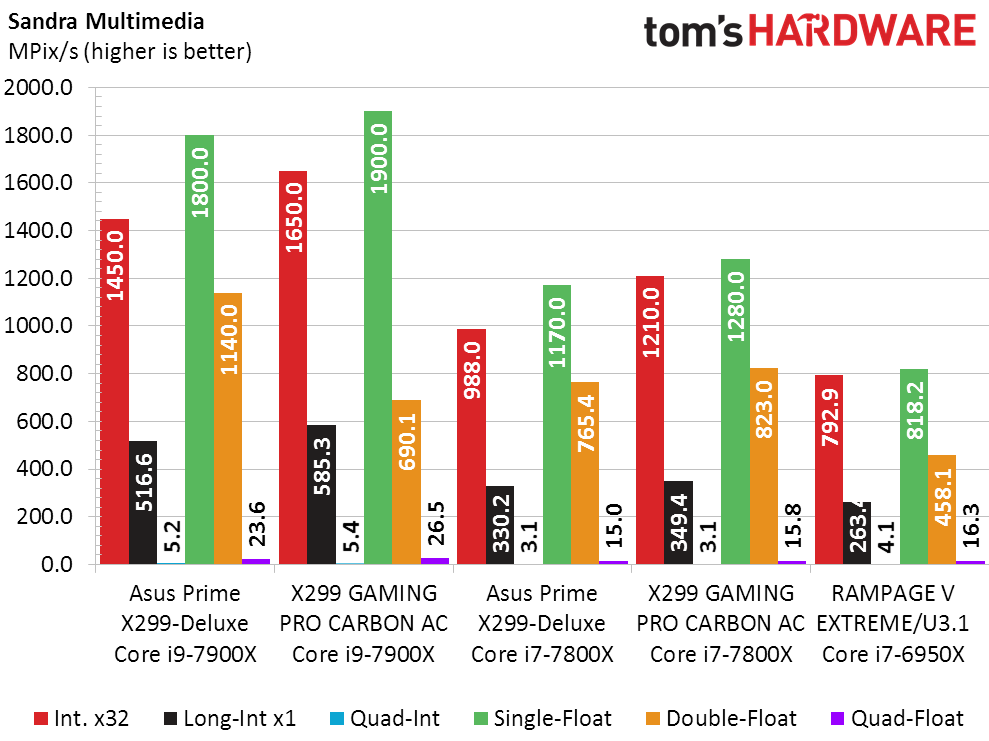
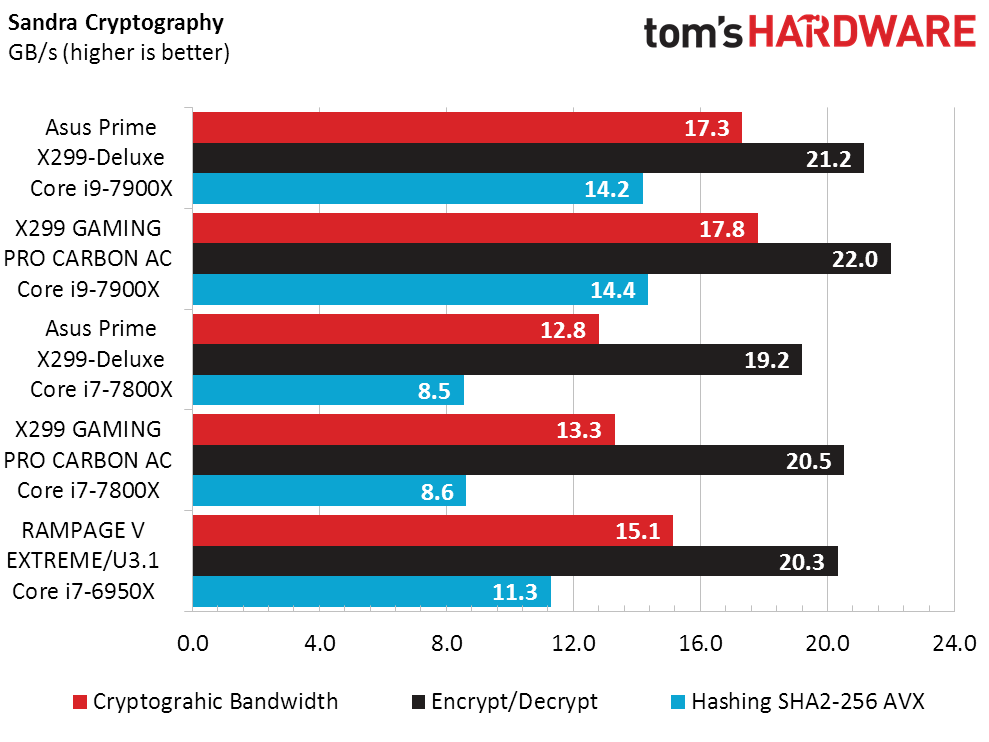
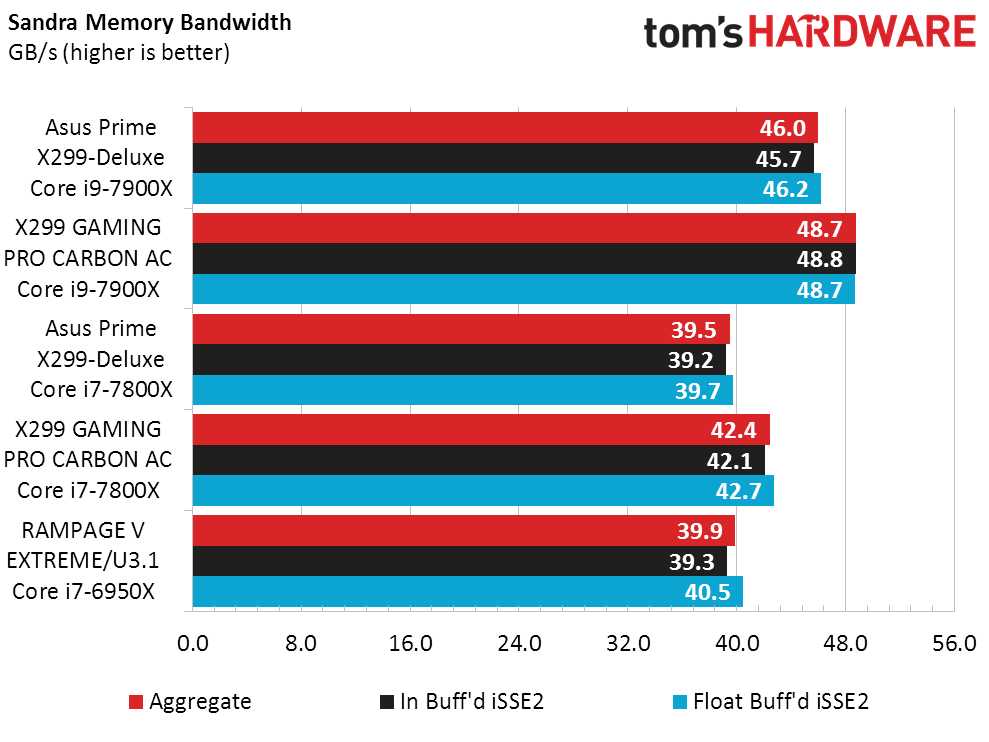
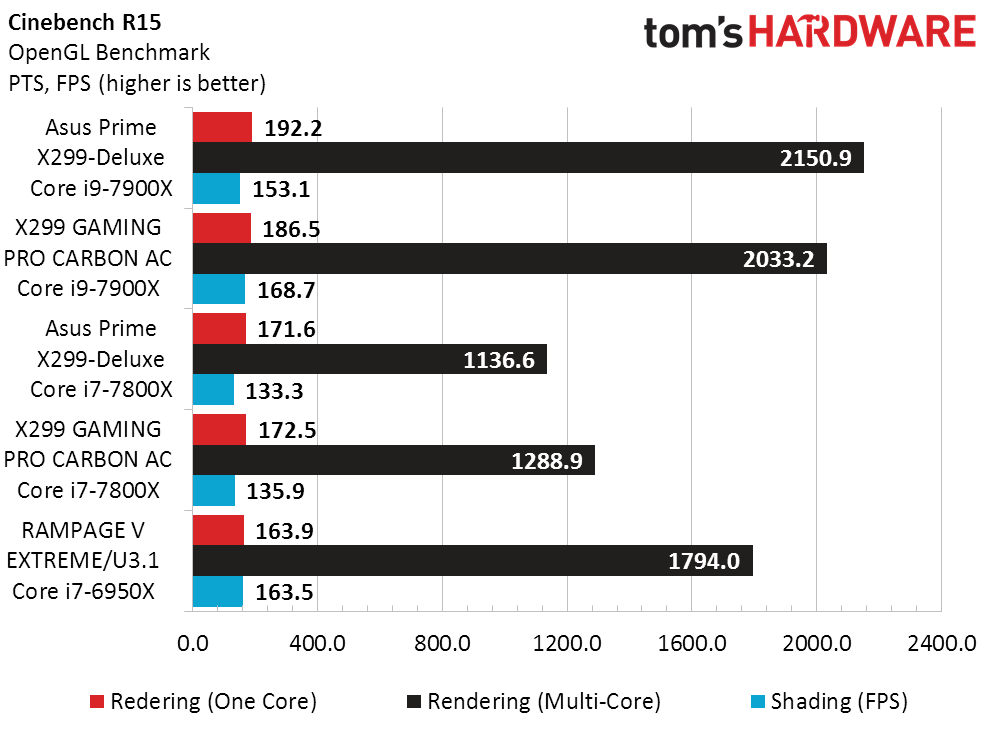
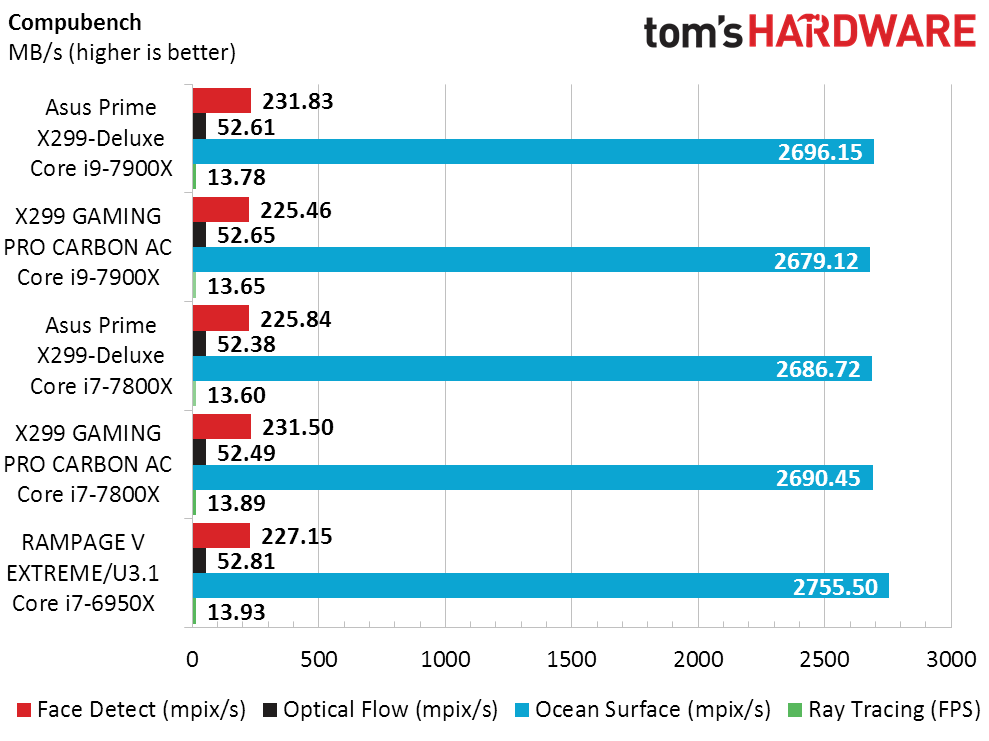
Minor inconsistencies between Asus and MSI motherboards creep in starting with Sandra Multimedia. MSI appears to have slightly more aggressive memory settings, but Asus leads Cinebench.
3D Games
The Asus Prime X299-Deluxe is bested by MSI's X299 Gaming Pro Carbon AC across Ashes, F1 2015, and Metro. We always enable each CPU's full set of power savings features and disable non-stock turbo settings to make competitions fair, as we believe that overclockers prefer to choose their own settings. Perhaps some of Intel’s green technologies aren’t fully functioning on the MSI motherboard?
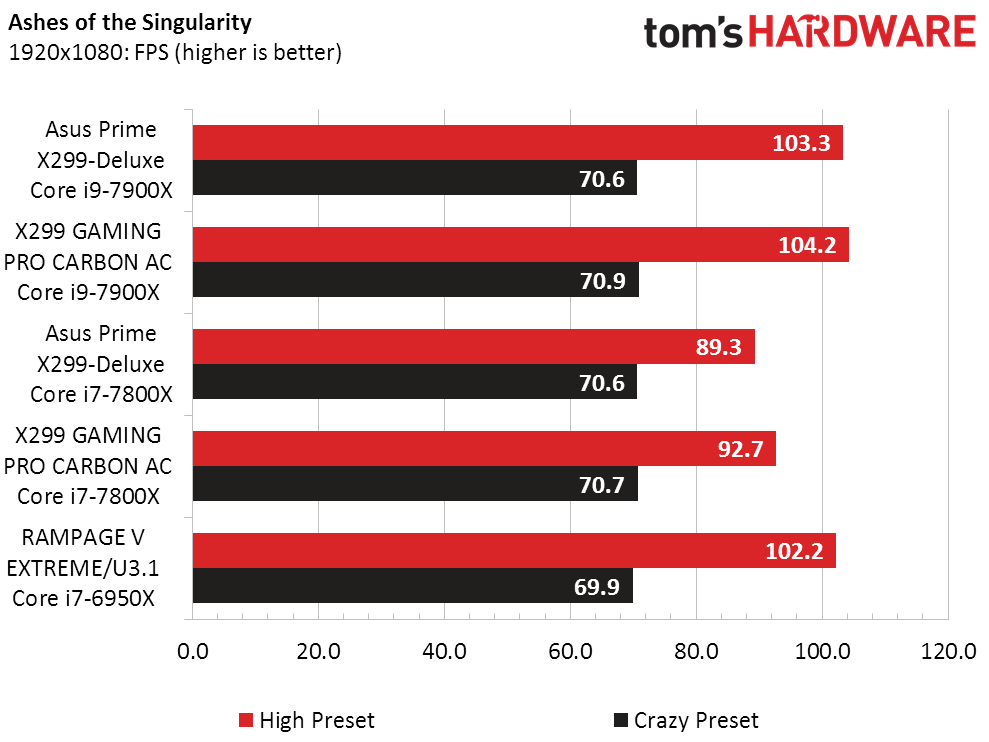
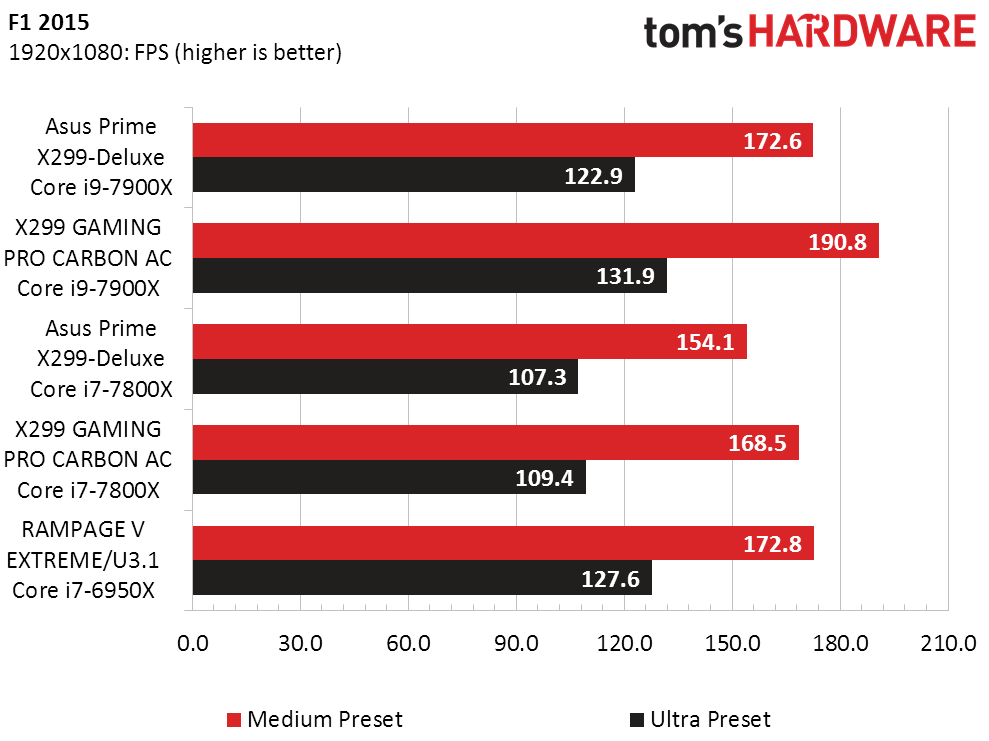
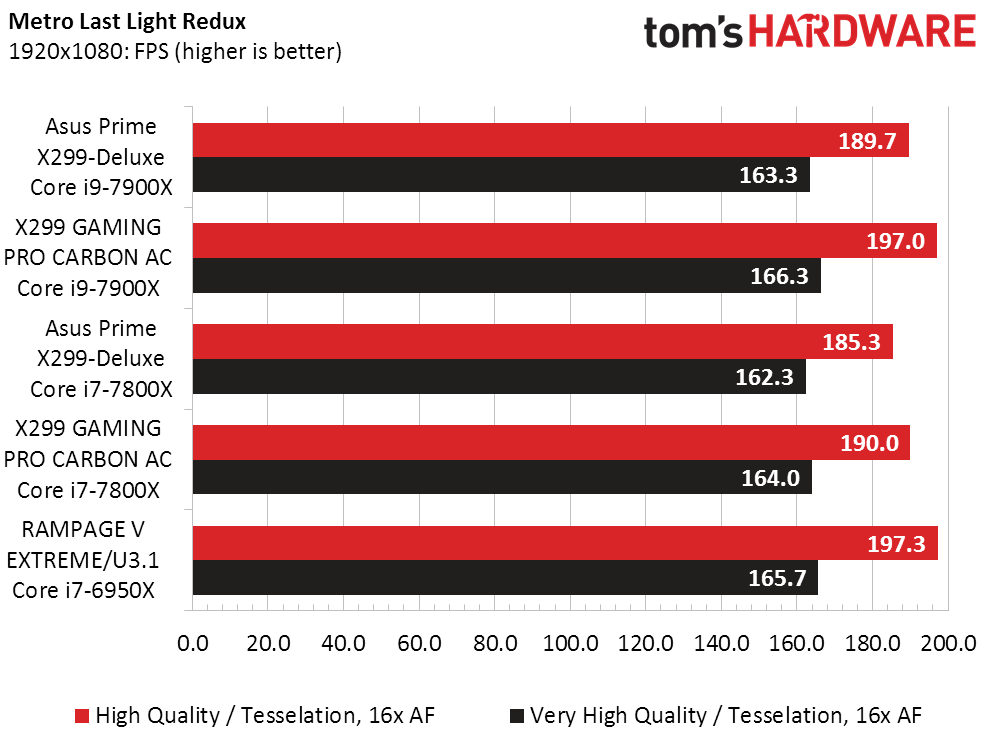
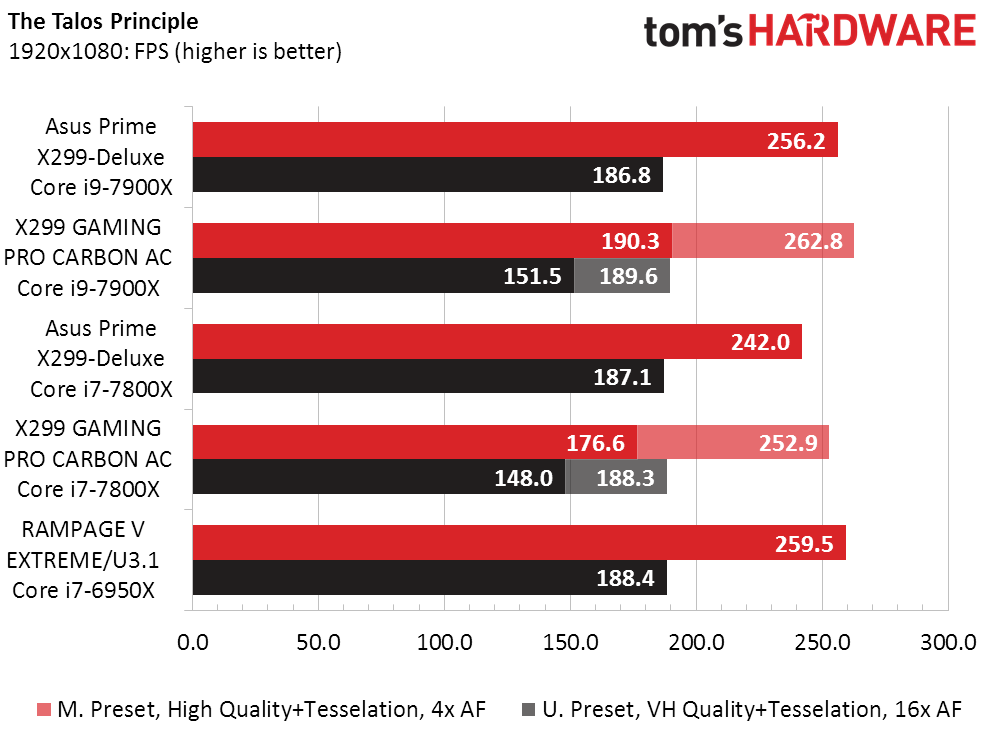
Talos rewards the Asus board, and punishes MSI, taking it down a notch due to the heavy load of its Nahimic software suite in this specific game. The faded bars show how the X299 Gaming Pro Carbon AC performs with Nahimic Audio Solution disabled.
Timed Applications
Less is more in timed application performance. Less encoding time means you get more work done.
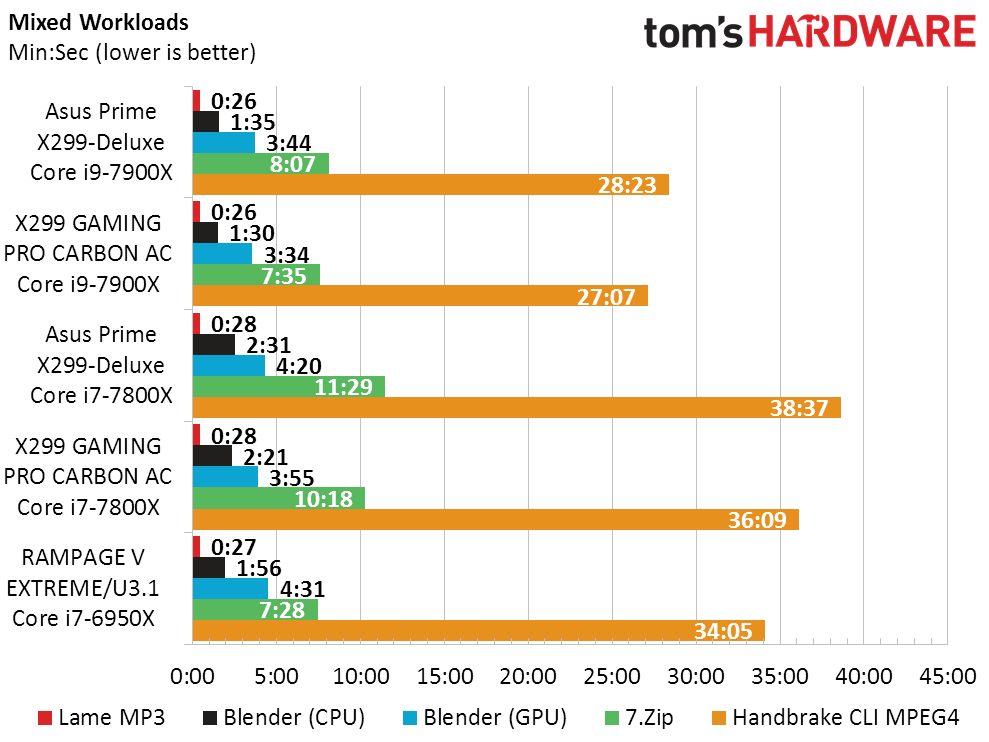
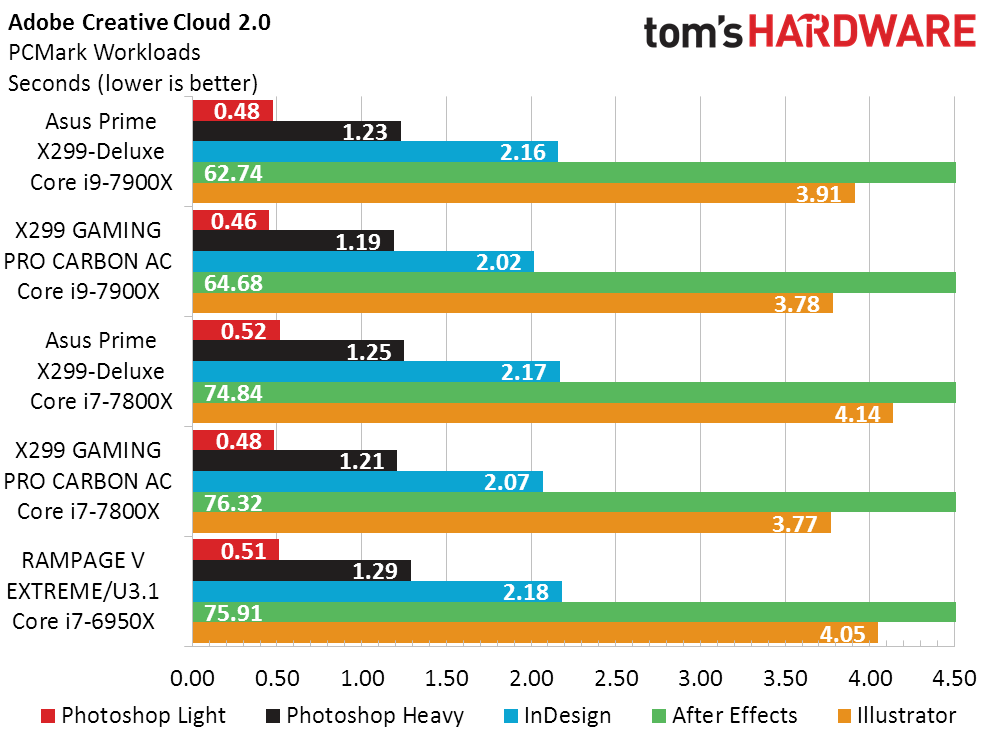
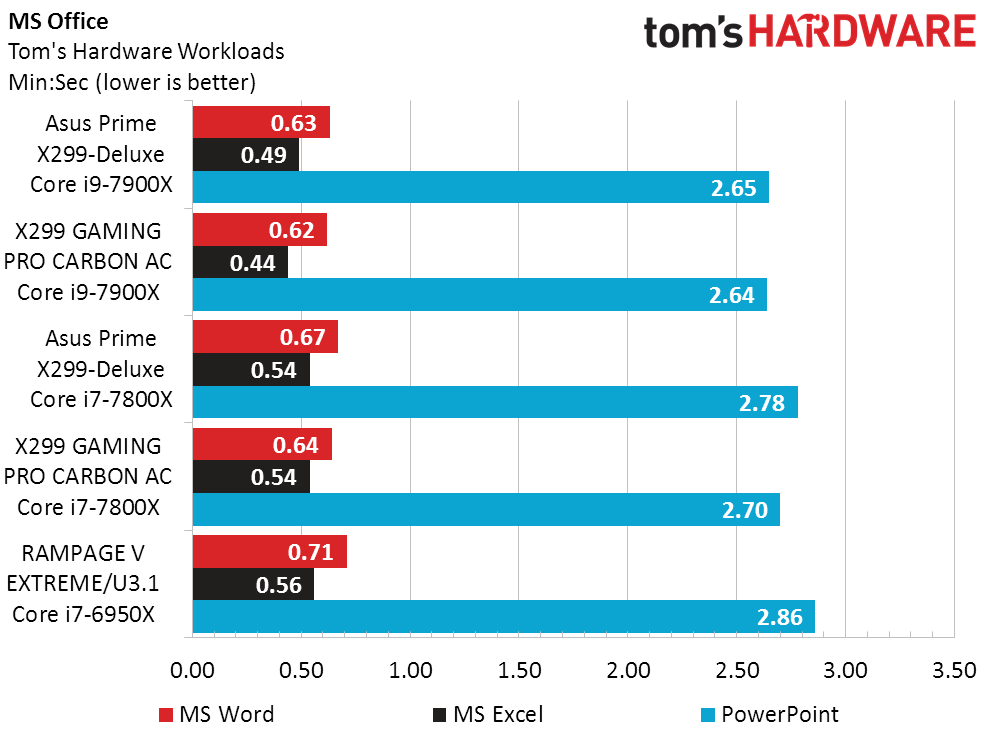
The Asus Prime X299-Deluxe falls to MSI's Gaming Pro Carbon across our mixed workload, but climbs back in the lead in Adobe After Effects.
Get Tom's Hardware's best news and in-depth reviews, straight to your inbox.
Power, Heat & Efficiency
We had suspicions about MSI’s potential power use after seeing it succeed too often in our benchmarks to call those wins coincidental, and the power chart confirms those suspicions. Full-load heat is also significantly higher.
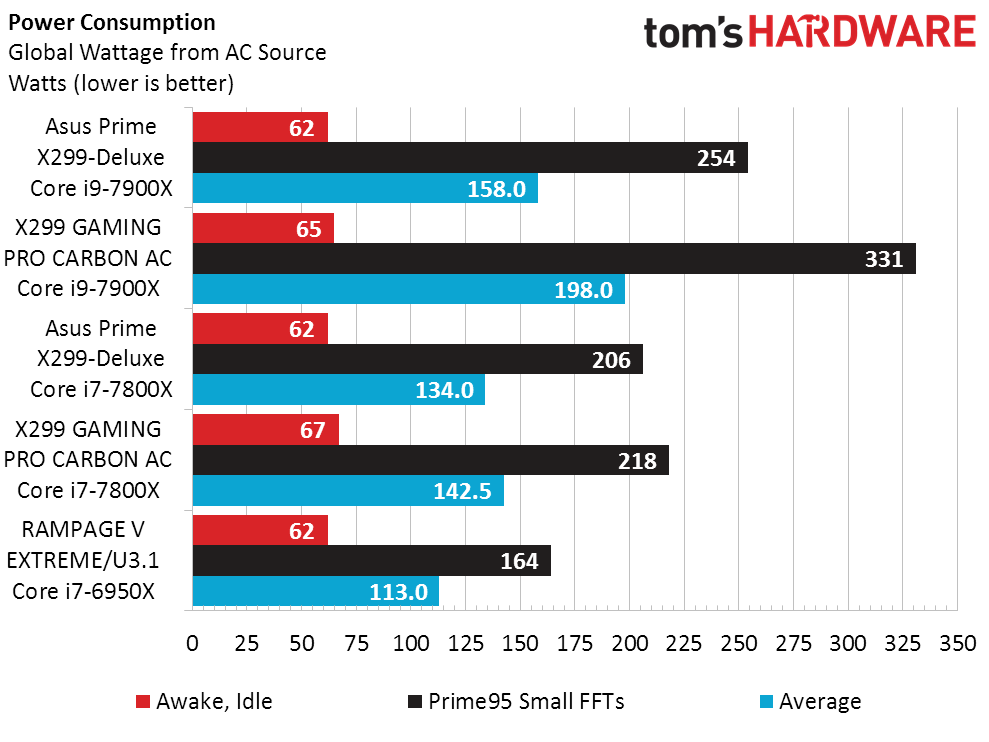
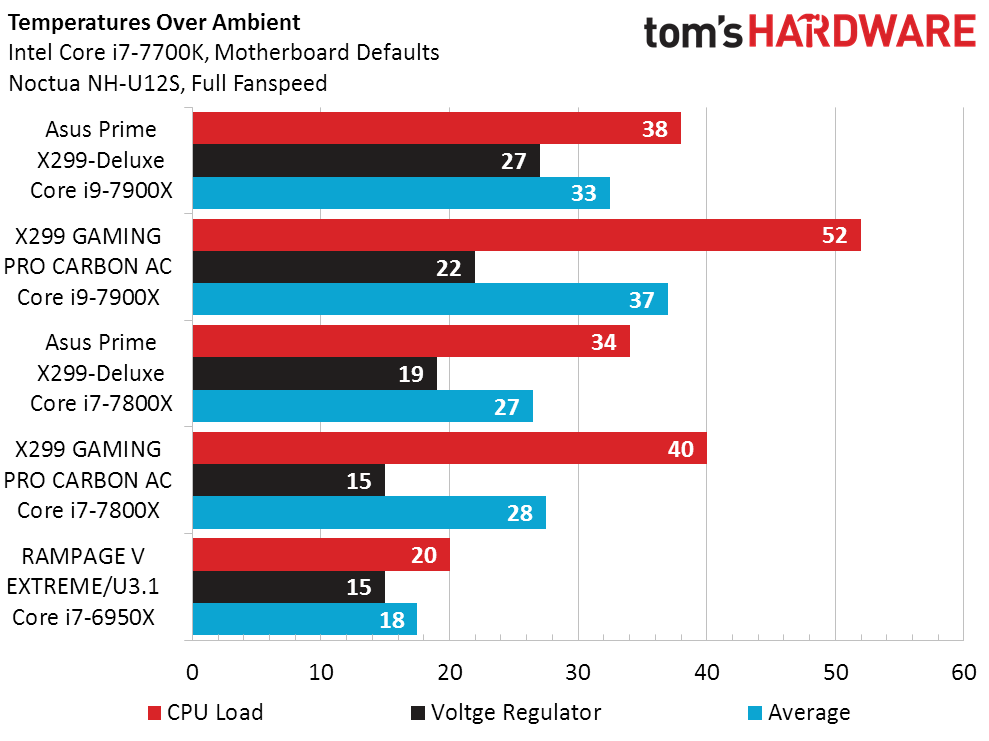
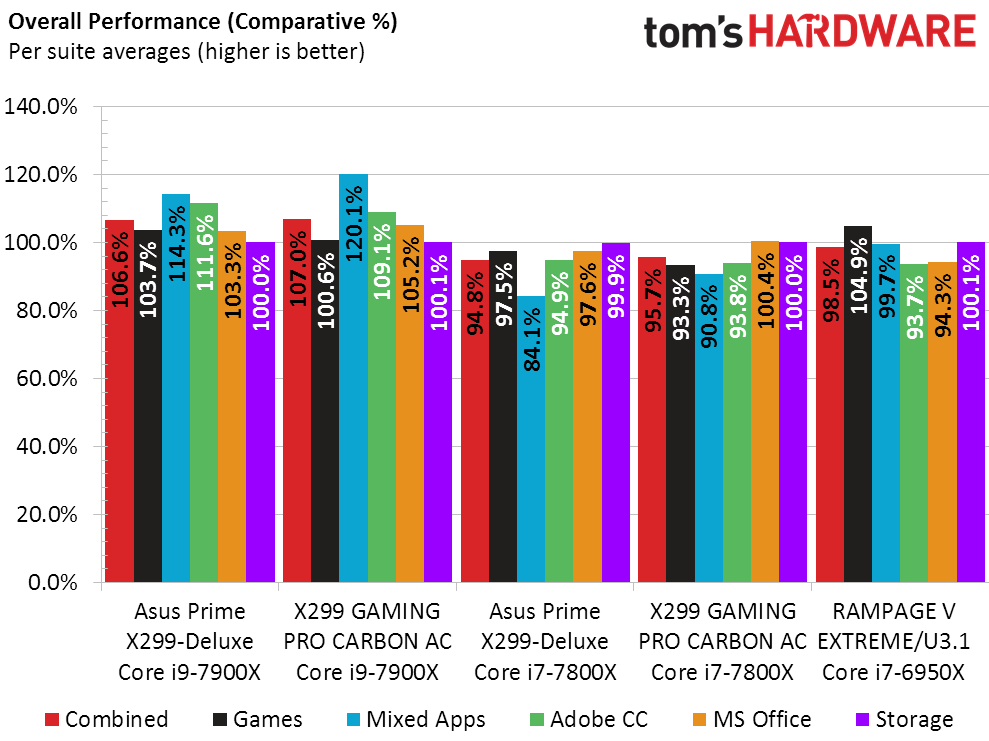
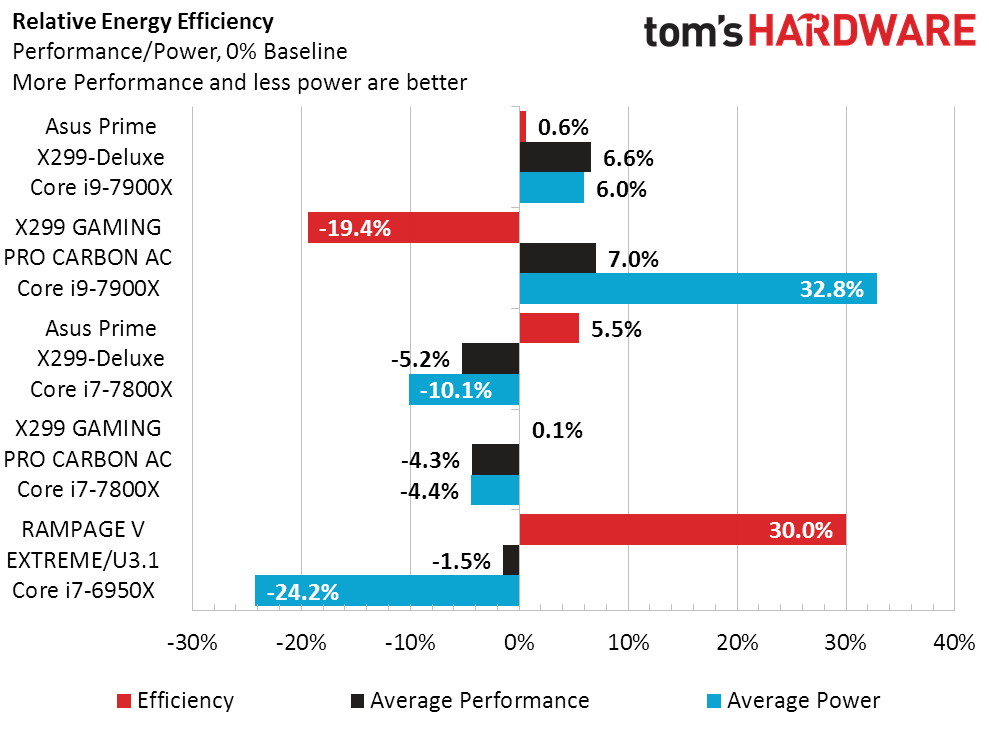
Considering the balance, the X299 Gaming Pro Carbon AC’s relatively consistent lead wasn’t large, unlike its increased power consumption. A retest may be required before comparing it to any future competitors.
Overclocking
While the Prime X299-Deluxe beats the X299 Gaming Pro Carbon AC overclocking either processor, the reason for stopping is different. While the Prime X299-Deluxe experienced the traditional system crash when taking our Core i9-7900X from 4.3 to 4.4 GHz at 1.20V, that same CPU would throttle down its eighth core when pushed past 4.20 GHz on the X299 Gaming Pro Carbon AC.
Surprisingly, the Prime X299-Deluxe switches positions in memory bandwidth against the X299 Gaming Pro Carbon AC, depending on which CPU is installed. We’ll likely find more consistency as these boards mature.
The Prime X299-Deluxe costs more and provide more features, and disregarding those features results in less performance per dollar. Perhaps I should have used a cheaper X99 motherboard as the baseline, just to knock the X299 Gaming Pro Carbon AC down a value peg?
Since we included several processors in these benchmarks, a processor-based adjustment reveals a little more about why a buyer who had not yet made the leap to a 6950X might be glad he or she waited for the 7900X. Value increases by nearly half when moving from the 6950X to 7900X, and by half again when scaling down from the somewhat-expensive 7900X to the mid-priced 7800X.
The value charts tell us less about the boards, since the difference in included features is vast. Including its second network controller, Thunderbolt 3 add-in card with DisplayPort cable, the additional components that make its Wi-Fi controller an 802.11ad solution, the OLED verbose status display, and even the extra fan module should add at least $100 to the price. It costs around $120 more than the X299 Gaming Pro Carbon AC, so it should be close to par in value.
Unfortunately, both boards are slightly too immature to issue an award today. The Prime X299-Deluxe is closer to where we’d like to see an awarded motherboard be at launch, and for that it gets “the nod” in lieu of any award. And maybe a wink as well.
MORE: Best Motherboards
MORE: How To Choose A Motherboard
MORE: All Motherboard Content
-
Crashman Reply
I expect it to drop quickly to $459 if that means anything to you :D19843269 said:489 dollars? lol
-
the nerd 389 If the state of Skylake-X is any indication, I'd expect it to drop quite a bit lower than $459. Intel seems to be turning disappointing product releases into an art form.Reply
Can you imagine trying to fit one of these CPUs into a 2U chassis? It would be a nightmare. -
Crashman Reply
I don't expect anyone to be shoving this board into a 2U chassis :D It's a premium board, you pay an extra $120 for all the stuff that comes with it.19843785 said:If the state of Skylake-X is any indication, I'd expect it to drop quite a bit lower than $459. Intel seems to be turning disappointing product releases into an art form.
Can you imagine trying to fit one of these CPUs into a 2U chassis? It would be a nightmare.
Now that whole Kaby Lake X nonsense makes even less sense, right?
-
Tom Griffin This might be able to replace my ASUS X79 Pro and I7-3960x paid a grand for that proc with six cores etc; this 10 core beast might just fill the bill for my development workstation. Will have to wait and see about AMD and infinity fabric and Intel's mesh and firmware updates.Reply -
drwho1 I don't get this SATA sharing, In this motherboard as an example we end up with 4 usable SATA ports... I need a lot more SATA ports available for JBOD drives. At minimum 10 SATA ports, I wish I could find a board with 18 SATA ports to be honest.Reply
Anyway, I passed on this... We need a way for M.2, U.2 and PCI-E to NOT share SATA ports, same for any new tech... should find something else to make useless... -
Crashman Reply
Welcome to the world of Kaby Lake X. These are the workarounds Asus put into the board to support it. If you want a bunch of drives, you have to use an adapter card and give up 3-way SLI (on 44-lane CPUs) or SLI (on 28 or 16 lane CPUs).19844684 said:I don't get this SATA sharing, In this motherboard as an example we end up with 4 usable SATA ports... I need a lot more SATA ports available for JBOD drives. At minimum 10 SATA ports, I wish I could find a board with 18 SATA ports to be honest.
Anyway, I passed on this... We need a way for M.2, U.2 and PCI-E to NOT share SATA ports, same for any new tech... should find something else to make useless...
-
Dill3377 Hopefully the FPS issues get worked out with the ASUS X299 deluxe board, was looking at getting a 7820X for gaming and light video editing for friends (yes I know it's crazy overkill, whole system is lol, it's a hobby), but that MSI board is killing it and I'm avoiding MSI if at all possible for mobo...Reply -
the nerd 389 Reply19845970 said:Hopefully the FPS issues get worked out with the ASUS X299 deluxe board, was looking at getting a 7820X for gaming and light video editing for friends (yes I know it's crazy overkill, whole system is lol, it's a hobby), but that MSI board is killing it and I'm avoiding MSI if at all possible for mobo...
It's not that it's overkill. It's actually not overkill at all. It's just very expensive, an epic pain to cool, and offers a dizzying array of incompatibilities and caveats for the price.
Save your money for ThreadRipper, or stick to Broadwell-E. Skylake-X isn't worth the effort, confusion, noise, or cost that comes with the 2066 socket. If you really need the performance, grab a dual socket E5 setup before considering the X299 platform. It's easier to cool, makes system design simpler, and you'll end up with a quieter machine. -
Dill3377 Reply19846251 said:19845970 said:Hopefully the FPS issues get worked out with the ASUS X299 deluxe board, was looking at getting a 7820X for gaming and light video editing for friends (yes I know it's crazy overkill, whole system is lol, it's a hobby), but that MSI board is killing it and I'm avoiding MSI if at all possible for mobo...
It's not that it's overkill. It's actually not overkill at all. It's just very expensive, an epic pain to cool, and offers a dizzying array of incompatibilities and caveats for the price.
Save your money for ThreadRipper, or stick to Broadwell-E. Skylake-X isn't worth the effort, confusion, noise, or cost that comes with the 2066 socket. If you really need the performance, grab a dual socket E5 setup before considering the X299 platform. It's easier to cool, makes system design simpler, and you'll end up with a quieter machine.
Yeah man I appreciate the advice and understand. Spent too many hours looking into all my options. To be frank, I don't think AMD will release an 8 core TR chip that's faster than the Ryzen 1700/1800 so as not to cannibalize their own product and the 7820x is performing 10-15% above the Ryzen chips for games. Money is not a factor for the most part, If I was interested in a single one of the other X299 chips I'd at least wait for TR4/Coffeelake, but the 7820x has no direct competitor, outside of Ryzen, and I don't think it will for a while. As for cooling, running custom water with a fairly beefy setup, not crazy worried about noise/heat (although I'm really unimpressed with how Intel has handled the heat..). OC3d is showing a 7820X running at 4.8Ghz at 1.22V with roughly 70 degrees under load. Even if he won the silicon lottery, I'd be fine with 4.5GHz at a similar voltage/temerpature. My 3570k runs at 4.6 at 1.2V and hits 65 under custom.
As for purchasing it, I will definitely wait for more reviews and maturation before I do. To add, the anti-consumer things intel does, albeit a dick move, don't affect me. I don't RAID, I'll never SLI, I'm only going to be running 1 NVMe drive. This truly is just an overkill gaming rig and I won't 'upgrade' my 3570k to another 4 core option, so 8 it is.
One last note: I am not trying to defend Intel at all and quite frankly, I want to give my money to team red, but I'm in a very specific boat and thus, not a lot of option left imo. I unfortunately/fortunately game at 144Hz and that 10% difference actually makes a difference lol, it's a vicious world. My 3570k is starting to hold my 1080ti in some games, so I've had to upgrade for a bit now.
